Many were so disillusioned with AAP that they left it in droves. A 10% drop in AAP's vote share is a pointer to that.
To assume that if AAP had teamed up with the Congress, the Congress' 6.3% vote share would have helped AAP retain control of Delhi is erroneous, argues Sudhir Bisht.

The abject rout of the Aam Aadmi Party in the Delhi assembly elections came as a big surprise to even its most ardent supporters.
Even diehard fans of the Bharatiya Janata Party hadn't expected that the BJP would wallop AAP in the battle of the ballot, and that the final score would be 48-22 in the BJP's favour.
The AAP debacle is accentuated by its supremo Arvind Kejriwal's defeat in the New Delhi constituency where he received 25,999 votes. The winner, the BJP's Parvesh Saheb Singh Verma, secured 30,088 votes. The difference between winner and loser was just 4,089 votes.
Placed third in the contest was Sandeep Dikshit of the Congress who received 4,568 votes.
Political analysts have made the claim that had AAP and the Congress teamed up for the Delhi election, Kejriwal would have defeated Verma by 479 votes. Their calculation is unpolished and simplistic, and is represented in the box below:
In terms of overall numbers, the difference between AAP and BJP isn't so great. AAP's total vote share is 43.57%, just 1.99% less than the BJP vote share.
The Congress vote share is 6.34%.
Thus, these commentators add up 43.57% and 6.34% and since the sum outweighs 45.56%, the BJP vote share, they promote the theory that the BJP won only because of the absence of a strategic alliance between AAP and the Congress.
This notion is far from correct.
To start with, election outcomes are NOT just about simple arithmetic.
While the overall vote share is important, the final seat number is NOT a function of overall vote share.
Besides, the votes of alliance partners are not as easily transferrable as we think they are.
The winner in our elections is decided by the first-past-the-post system and NOT by proportional representation. It is even possible that a party may receive higher number of votes in all the constituencies of a state and yet lose the state elections.
This can happen if a party wins by huge margins in less than about 49% seats and loses by small margins in, say, 51% seats.
Vote share helps a party if its vote share is more in a majority of seats. Overall, votes mean nothing in isolation.
A minor impact in vote share can have a drastic effect on the overall seats of a party in the first-past-the-post system.
The table gives the vote share of the three principal parties over the past three assembly elections in Delhi, including the 2025 elections.
A 6.2% increase in the BJP vote share in the 2020 Delhi assembly election (over the 2015 assembly election) led to an increase in the number of seats from 3 (in 2015) to 8 (in 2020).
A 7% increase in the BJP vote share BJP in 2025 (over the 2020 election) has led to a six fold increase in seats -- from 8 to 48.
This is the exquisiteness -- some would say irony -- of our electoral system. There is simply no firm causal relationship between overall vote share and overall seat tally in a statewide or a nationwide election.
There is a positive correlation between the two variables -- overall vote share and overall seat tally -- but no causal relationship.
In the 2018 assembly elections in Madhya Pradesh, the Congress vote share was 40.9% as against the BJP's 41% vote share. And yet it was the Congress that won 114 seats against the BJP's 109 and formed the government in the 230-member MP assembly.
Returning to the New Delhi assembly seat from where Kejriwal lost to P S S Verma, some political commentators have sought to bring out the revenge angle in the triangular fight.
Congress candidate Sandeep Dikshit is the son of the late Sheila Dikshit, the three term Delhi chief minister who was bested by Kejriwal in December 2013.
It is believed that Sandeep Dikshit dislikes Kejriwal for the manner in which the AAP leader defamed his mother before the 2013 assembly elections. For many Delhi old-timers, Sheilaji was the epitome of grace and civility who endeared herself to citizens in Delhi.
For some it is as if Sandeep is seen telling Kejriwal, 'You defeated my mom and now I have taken revenge by slicing you!'
Alliance chemistry doesn't follow the rule that 'my party voters will also vote for my alliance partner if my party isn't in the fray.'
It is not necessary that an AAP voter would prefer the Congress over the BJP. In fact, the opposite could be equally true.
In 2015, I had met with many voters who were BJP sympathisers but voted for AAP because they thought that AAP represented a new kind of politics that valued honesty and probity over any political or economic ideology.
In 2015, the Congress image had plummeted as it was beset with scams like the CWG, coal and 2G. There was a very large chunk of voters that deserted the Congress in 2013 and went over to AAP. but it is not the case that none of the BJP supporters crossed over to AAP.
There are many swing voters who keep crossing over from one party to another. This crossover is a continuous affair and can't be determined with precision.
That's why the electorate of Delhi that voted so decisively in the 2014 and 2019 Lok Sabha elections in the BJP's favour, rejected it in the assembly elections of 2015 and 2020, without any compunction.
It is as if the citizens of Delhi wanted Narendra D Modi to lead the nation and Kejriwal to lead the National Capital Territory.
The BJP vote share in the 2008 Delhi assembly elections was 36.34%. This went down to 33% in the December 2013 elections and further down to 32.3% in the February 2015 elections. Consequently, a lot of people who were voting for AAP have been BJP supporters who switched loyalties since 2013.
Once this section realised that AAP had strayed from its high ideals of honesty and probity in public life and the party was entangled in the alleged liquor scam, they simply went back to the BJP.
In 2025, many Delhi voters cast their votes not based upon party affiliation but because the ruling party didn't fit into their scheme of things and hence needed to be voted out.
Many were so disillusioned with AAP that they left it in droves. A 10% drop in AAP's vote share is a pointer to that. To assume that if AAP had teamed up with the Congress, the Congress' 6.3% vote share would have helped AAP retain control of Delhi is erroneous.
Delhi's Congress leaders have greater antipathy for Kejriwal than they have aversion for the BJP. From Ajay Maken to Sandeep Dikshit, Delhi bigwigs of the Congress party have no love lost for Kejriwal.
It is common knowledge that the cases in the alleged liquor scam were first filed in June 2022 by former Delhi Congress president Chaudhary Anil Kumar. The BJP's entire campaign against AAP is built around the same alleged liquor scam.
That Kejriwal and Manish Sisodia had to spend time in jail is thanks to the initiatives taken by prominent Delhi Congress leaders.
So, the animosity between Kejriwal and Congress leaders is not only profound, it is palpable. That's the reason why the BJP swept all seven Lok Sabha seats in 2024 which AAP and the Congress fought together under the INDIA label.
In my analysis it is just wishful thinking that if AAP and Congress had collaborated, they would have prevented the BJP from roaring back to power in Delhi after a 27-year hiatus.
My instinct is that it will be very challenging for Kejriwal to keep his flock together in Delhi.
It would take a brilliant comeback strategy and grinding hard work and some penance for Kejriwal to redeem himself in the eyes of Delhi citizens.
He entered politics to cleanse the dirty waters of politics but has left Delhi politics dirtier than the Yamuna river that he forgot to clean as well.
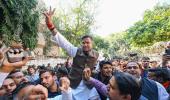
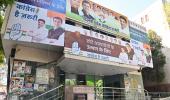
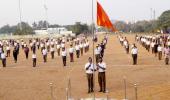
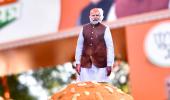
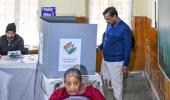






 © 2025
© 2025